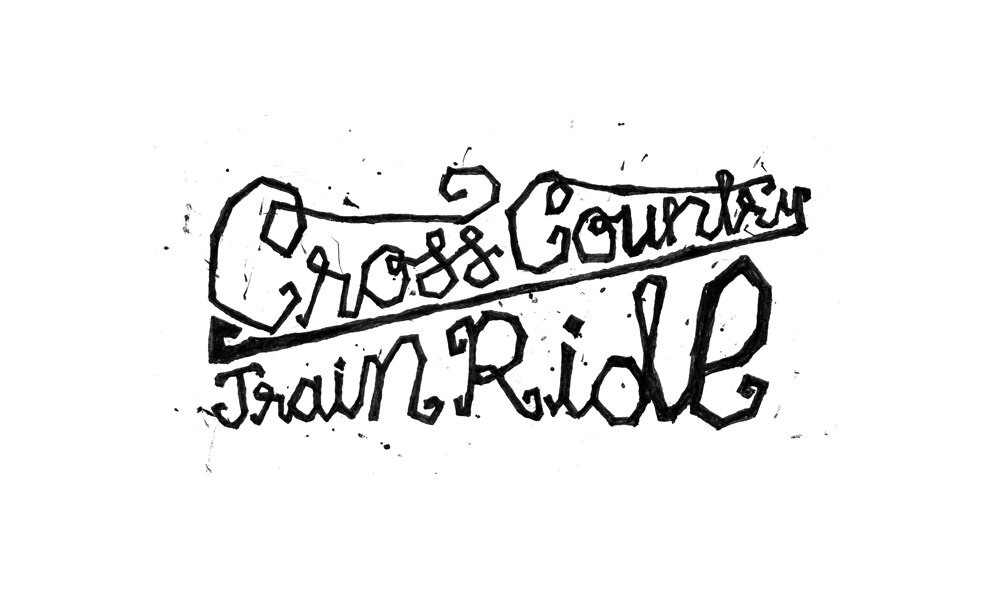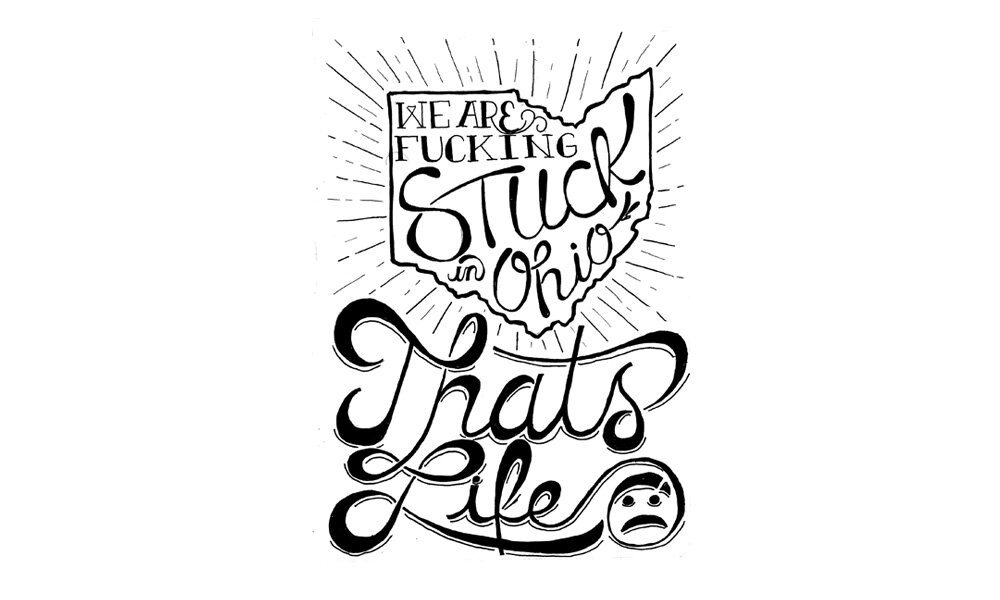From Practice to Professional—Turning Your Side Hustle Into Your Dream Career
I recently had the distinct honor of talking with Ladies Wine and Design Denver on the topic of The Side Hustle. More specifically, how I went from lettering for fun for the first time four years ago to currently lettering as my career. I had numerous individuals ask if this talk was going to be recorded, so I decided to write my first blog post on the subject.
The following is an “in-hindsight” perspective on how I went from practice to professional over the past few years, and some cliff notes on what I think the three most important steps that I took to make this possible.
1) Have an uncompromising drive to create and learn. Make the time to practice/push your side hustle, and do so with zero expectations—including when its unpaid.
It's easy to be stifled by your own goals. The idea of turning your hobby into a full-time career is overwhelming—the how’s, what’s, and when’s are innumerable. Where the hell do you even start?
The answer is “It doesn't matter, just start.” Not overthinking anything, and try everything was one of the most beneficial things I did for myself when i got started. I didn't overthink the “how”: how will this benefit me or be profitable in the future? I just focused on the “what”: practicing hand lettering. I had no expectations to turn this practice into profit. In the beginning, every piece that I created had very little thought behind it—if I drank coffee that morning I wrote “Coffee”, if I was in a fun city that weekend i’d write out the city name.
There are so many famous quotes that apply to this mentality “ready, fire, aim.”, “done is better than perfect”, “making a few mistakes is better than making nothing at all”—We've all heard them. Each of these quotes speak to the importance taking simply doing, not over-thinking, and then reacting to those actions after the fact. There is immense value in the momentum associated with just getting started—don’t obsess over the details. An object in motion stays in motion...
In addition to forcing yourself into motion, you must deliberately make the time for your side hustle. Before you even think to yourself “I'm too busy”, consider that we all somehow seem to make time for the things that we really want to make time for. Do you want to make your side hustle your full-time gig?
If you think you don't have time, please consider the following opportunity:
You don’t need 8 hours of sleep. I average 6.5hrs. If you can wake up 30 minutes earlier during the week, giving yourself 30 minutes before or directly after work that averages out to 130hrs / year.
If you chose to spend your 1 hour lunch break working on your side hustle every day, that’d be 260hrs / year
On a conservative estimate, I'll assume that we all watch 3 hours per week of Netflix/TV. Either work on your side hustle during this time, or better yet, replace that TV-time completely, and that equates to 156hrs / year.
Simply reallocating your time, and the fairly minimal effort placed in doing the above, you find yourself with a whopping 546 extra hrs / year that you can invest in your side hustle. 546 hours is roughly 13.5 (40hr) work weeks. Thats 3.3 months of time you can dedicate to your side hustle, and this isn’t even touching your weekends. Woah...
If you think that you don’t have time to work on your side hustle, I would encourage you to reevaluate your priorities and where you're spending your time, and asses how much value are you actually getting out of what you’re currently making time for.
2) Develop, foster and leverage both a digital and personal network.
One of the best things I have done for my business was putting myself "out there": developing both a social media network as well as going out of my way to meet other business owners and creatives in person. I know it's scary, but go talk to people. Use your face, not just your phone. I received immense value in just talking about what I do as well as learning what other business owners/creatives do. The connections fostered through networking have time-and-time again proved to be invaluable for me. As the ol' saying goes, “it’s not what you know, it’s who you know."
Leveraging Social Media
Expose yourself to the top of your industry: Go take a look at who is doing what you want to be doing with your career/business/job. How do these people/brands present themselves/their business? How do they speak to their audience? Now, lose any ego you may have, email these people, and ask them questions—How much do they charge? How do they manage projects? Where do they find clients? How do they write their contracts?
When I began lettering I emailed numerous superstar hand lettering artists (thanks, Ryan Hamrick, Adam Weaver, Sean Tulgetske, among many others) and their simple answers to seemingly huge obstacles saved me an incredible amount of time and hair pulling. Approach your idols humbly, don't be a dick, be sensitive with the (very) valuable information the graciously give you, and be gracious! Leverage their experience, and this could save yourself months or even years of uncertainty. Now, pay it forward.
Be yourself. People like to feel like they know you. Be personable, and interact with your following.
Share what you’re doing. Whether that means on social media, on the web, or with mentors/investors. Get your ideas out there.
For me, this meant sharing almost everything I drew for the past four years on Instagram. Sharing on social media does a number of things for you:
Consistent posting shows persistence and dedication to your craft, and lays the foundation that establishes you as a professional in the coming years.
Consistent posting helps you find and establish your brand voice/message/goals.
Consistent, honest posting makes you relatable to everyone—they see you trying, learning and practicing, and therefore the feel comfortable putting their guard down and interacting with you without fear of judgement.
Your social media network can become your biggest network of supporters! They are a segment of your audience that is most likely to purchase a product or service that you offer.
I recently received one of my single highest paying contracts as a freelancer. During our single phone call I asked the Creative Director why they selected me. He simply stated “one of our designers recommend you. We took a look at your work, and we liked your personality, so we thought you’d be a good fit for the project.” Let that resonate: "we liked your personality." At this point I had exchanged no more than five emails with this man, and we had one phone call; however, he felt like he knew me enough through my photos, captions and interactions to say “we liked your personality.” That right there is a beautiful example of why you should foster your social networks.
Leveraging Personal Networks
Almost every noteworthy opportunity in my career has come through my network or through a referral. Networking is one of the most important things that I’ve done for myself. Whether or not you’re networking directly within your industry, it is massively important to just start talking to people. Meeting people (yes, with your face) is beneficial for a few reasons:
Networking connects you with people better than you/more experienced than you. Ask them questions, and learn from them.
Networking keeps you at the forefront of what is happening in your industry in your community, and beyond.
Networking keeps you as well as at the forefront of peoples minds. Yes, there are 1,000's of people who do what you do, but if you're the most recent "one" that someone met, and you left an impression, you're more likely to receive the opportunity.
Maybe most importantly, face-to-face networking forces you to talk about what you do to different/new people with different levels of understanding of your industry. This forces you to truly understand what it is that you’re saying, and it reiterates and reinforces your own product/process/business values/ethos/message/mission on a much deeper level.
3) Articulate your goals, and pursue them with intention. Always be working towards something. Just as important as the goal itself is to let the world know, so that you are held accountable.
After my first trip abroad—4.5 months in Asia—I felt that the standard 9am–5pm world I had come from was no longer for me. Or at least, I knew that I had to try and make things work outside of those confines.
I had realized that my love for building relationships, helping people, travel/the outdoors, and lettering were my passions, and I wanted to do work that fulfilled those passions. Over the past year I have really made the push for more lettering work in my career, but more specifically, with brands in the outdoor/lifestyle space. I did this by promoting this lifestyle/style of work on my social media, I updated my website as to show more lettering work, and I showcased my love for travel. Since this push I have had the opportunity, to do 8 branding projects that were lettering-based, I’ve landed two of my favorite lettering projects with Sharpie and *a client that I currently can't name, and I’ve had the pleasure of working with Mountain Standard, Movement Climbing and Fitness, Zeal Optics and Brooklyn Boulders (the latter two are still in the works.
Psychologist Elizabeth Lombardo, author of the book Better Than Perfect: 7 Steps to Crush Your Inner Critic and Create a Life You Love, points out that the positive reinforcement by public progress is motivation to continue moving forward, and ultimately encourages you to create larger goals. (source)
Sharing your goals with the world also forces you to be positive. When talking about what you want to do publicly, you will find yourself wanting to set a good tone and/or example for others. “Nothing can stop the (wo)man with the right mental attitude from achieving his goal; nothing on earth can help the (wo)man with the wrong mental attitude.” – Thomas Jefferson
In addition to pushing lettering in my career, this year I also realized how much I love painting murals. So, I put that sentiment out into the world. I made a presentation that I sent out to numerous companies/my network, and I simply explained why murals are helpful for a business and I showed a few examples of my work to establish me as a viable candidate to paint these murals. I have since painted 5 lettering-based murals and there are still a few more to come this year! Ask and you shall receive.
Overall, a few simple changes can have a drastic impact on how quickly you can turn your side hustle into your full-time gig:
Simply, reprioritizing and reallocating your time (you have 3.3 months right under your nose);
Developing, fostering, and leveraging both a digital and personal network
Articulating goals that you share with others who can hold you accountable.
I have personally seen and reaped the benefits of adopting these practices, and it has enabled me try hand lettering for the first time four years ago to this art now comprising 90% of my income. These actions won't necessarily set everyone up to be full-time-side-hustling in a few years; however, they absolutely will function as a solid foundation and source of momentum that will propel you and your business in the right direction.




